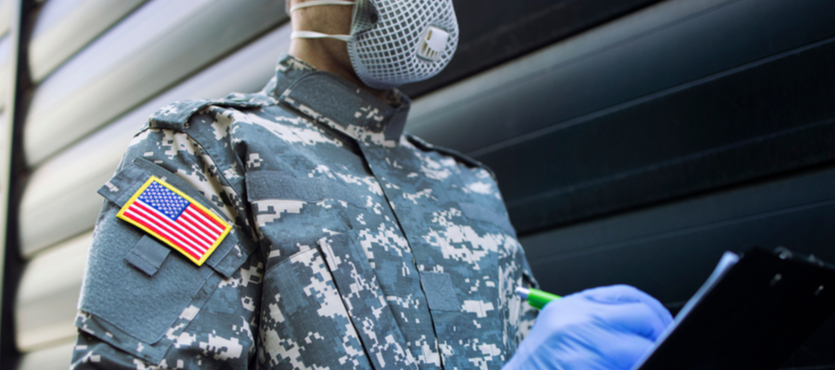Military action was the root of the Spanish Flu pandemic in the early 20th century. Was it also the root of the COVID-19 pandemic?
Coronavirus was an issue on many crowded Navy ships. These ships caused great consternation in places like Okinawa and Guam. Furthermore, aggression against China and Iran diverted resources from public health matters, at least according to some.
Curtailing such activities and reallocating resources may be the key to a successful coronavirus recovery.
World War I and the “Spanish Flu”
We put that phrase in quotation marks because the Allied powers, mostly the United States, France, and Great Britain, did not want people to link the flu pandemic with the Great War. So, they gave it a nickname related to a neutral country, which happened to be Spain.
But the truth was much different. Historians have almost conclusively established that the first cases of this flu epidemic were at Fort Riley, Kansas. Shortly before breakfast on March 4, 1918, a day which will live in infamy, Private Albert Gitchell’s sore throat, headache, fever, and other flu-like symptoms prompted him to visit the medical tent. Within days, 100 other soldiers were complaining of similar symptoms.
These cases were only the tip of the iceberg. By the time they geared up and left the base, most of the soldiers at Fort Riley were probably infected. Things got worse in the Western Front’s crowded and unsanitary conditions. When the fighting ended and these troops went home, they carried the virus with them. The flu eventually reached every corner of the globe, including places like China, which had no role in the war.
The Spanish Flu had a radical effect on the course of the war. Right at the time the flu arrived, the German Imperial Army was making its last push toward Paris. Things looked grim for the Allies. American troops had not yet arrived in force, and Russia’s surrender freed up tens of thousands of veteran German soldiers.
But the German offensive was largely smoke and mirrors. The flu sharply reduced manpower and morale, both of which were in very short supply at the time.
Historians might now know the origin of the Spanish Flu, but they still don’t know how many people it killed. Estimates range between 17 and 100 million people. As of April 2021, the COVID-19 pandemic has claimed about 2.5 million lives worldwide. So, at least in terms of deaths, there’s really no comparison between these two pandemics.
Where Contractors are Deployed
The Spanish Flu began in America, spread throughout the world, and radically affected the course of military action. Today, private military contractors do the same thing. From their home bases in the United States, most private military contractors deploy to Middle Eastern countries like:
- Iraq: Mostly to defuse tensions with Iran, the Biden Administration is seriously thinking about removing most or all American troops from Iraq. If that happens, contractors would almost certainly stay behind to protect American installations.
- Afghanistan: Troops may be leaving here soon too, partially because a semi-workable peace plan seems within reach and partially because everyone is sick of war. Recently, the Americans seriously considered completely privatizing the Afghanistan War. With combat activities largely reduced to defensive operations, that might still be an option.
- Syria: Contractors played an important role in American combat operations in this war-torn country. They may play an even bigger role in the rebuilding process, which should begin in earnest very soon.
- Kuwait: Because of its long coastline, strategic position, and fiercely pro-American government, Kuwait is basically a staging area for operations in the entire MENA (Middle East and North Africa) region. Many servicemembers dislike such remote areas, but contractors embrace them.
Because of a potential conflict with China, more contractors are also deploying to the Far East. For example, Guam is no longer a sleepy island in the Central Pacific. It is a strategic staging area. Contractors are busy on Guam, mostly renovating and expanding facilities that date back to the Vietnam War era or even earlier.
Injury Issues
Infectious disease is just one of the many possible illnesses that contractors risk when they go overseas. Some other ones include:
- Hearing Loss: Partial or total deafness is one of the most common service-related occupational diseases. Loud noises are not just on the firing range or in combat. Many busy bases, especially airbases, are very noisy. Exposure to noises as low as 35 decibels, which is basically a subway train, could cause permanent hearing loss.
- Toxic Exposure: Combat contractors often breathe burn pit smoke. These toxic clouds have been linked with a number of serious diseases. The Veterans Administration denies this link, but the Department of Labor, which administers the Defense Base Act, has embraced it. Rebuilding contractors often deal with asbestos. Anything built before about 1980, which includes most of the installations at places like Guam, probably contain asbestos. One microscopic fiber could cause cancer if inhaled.
- Repetitive Stress: Most contractors do lots of bending, kneeling, and stooping. Over time, these maneuvers cause a lot of strain on the back, knees, ankles, and other parts of the body. Even if a pre-existing condition contributed to the repetitive stress injury, substantial compensation is usually available.
The Defense Base Act replaces lost wages and pays medical bills if any infectious disease or other occupational disease strikes a victim who is an overseas contractor. Normally, victims receive two-thirds of their average weekly wage until they can get back to work. The DBA usually applies to all reasonably necessary medical bills, whether they are hospital bills or ancillary costs.
For more information about the specific benefits available, contact Barnett, Lerner, Karsen, Frankel & Castro, P.A.

